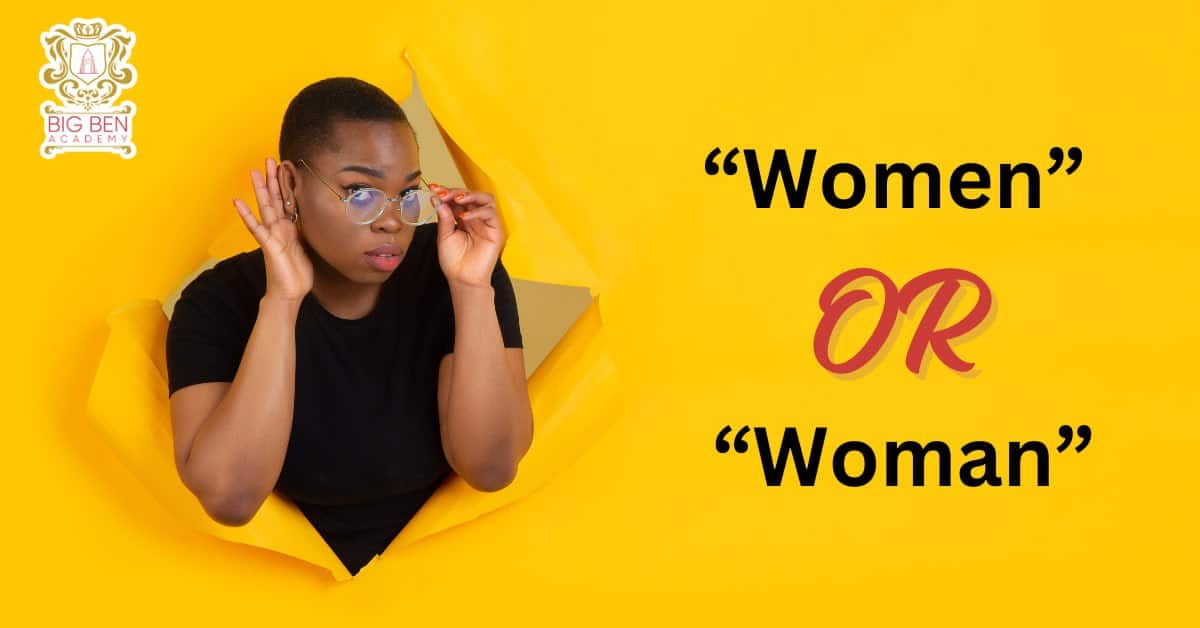
Women or Woman? How to Use Each Correctly
In English, understanding the difference between singular and plural nouns is important, but it often causes mistakes in writing and speaking. This is especially common for the words “woman” and “women”. Using these words incorrectly can change what a sentence means.
This article will explain the correct way to use these two words. It is important to understand the difference between “woman” and “women” in order to communicate effectively in both formal and casual settings.
Table of Contents
- What is the Meaning of Woman or Women?
- What Are Singular and Plural Nouns?
- Sentence Examples of “Woman”
- Sentence Examples of “Women”
- Differences Between “Woman” and “Women”
- Common Mistakes in Writing “Woman” and “Women”
- Common Confusion in Speaking
- Tips to Remember the Difference
- Conclusion
- Frequently Asked Questions (FAQs)

What is the Meaning of Woman or Women?
In English, it is important to understand the difference between "woman" and "women" to use them correctly. "Woman" with an “a” refers to just one adult female, which is a singular noun.
On the other hand, "women" with an “e” is a plural noun used for talking about more than one adult female. Knowing when to use each of these terms is necessary to indicate correctly whether you are speaking about one or more adult females.
What Are Singular and Plural Nouns?
A singular noun refers to one single entity, such as a person, place or thing. It is the simplest form of a noun. In this case, “woman” is a singular noun used when talking about one female individual. Similarly, another example is “man,” which is used to refer to one adult male individual.
Conversely, a plural noun refers to a word that represents more than one person, place, thing or idea. "Women" is the plural form of "woman," which is used when referring to more than one adult female individual. Another example similar to this is “men,” the plural form of “man”. It is used when referring to more than one adult male individual.
Sentence Examples of “Woman”
- She is a remarkable woman, having overcome numerous obstacles to achieve her dreams.
- A woman called earlier asking for directions.
- The woman at the front desk provided helpful information about the event.
- I met a woman at the art gallery who had a deep appreciation for abstract paintings.
Sentence Examples of “Women”
- The group of women organised a community event.
- Women from various backgrounds came together to discuss important social issues at the conference.
- Several women from different countries participated in the conference.
- The women's soccer team won the championship for the third consecutive year.
Differences Between “Woman” and “Women”
| Aspect | Woman | Women |
|---|---|---|
| Number | Singular (one) | Plural (more than one) |
| Usage | Refers to one adult female | Refers to more than one adult female | Example | The woman is a doctor. | The women are teachers. |
Common Mistakes in Writing “Woman” and “Women”
Misuse of "woman" and "women" in writing often results from confusion between singular and plural forms. A common error is using "women" when referring to a single female individual or "woman" for multiple female individuals. This mistake can lead to unclear communication and may convey a lack of attention to grammatical details.
Common Confusion in Speaking
The confusion in pronunciation involving "woman" and "women" during speaking often occurs because their pronunciation can be confusing. "Woman" is pronounced with a short 'o' sound, like "wo-man," emphasising the singular form for one female individual. On the other hand, "women" is pronounced with a short 'i' sound, as in "wim-en," indicating it refers to more than one female individual.
People sometimes mistakenly use one for the other when speaking quickly or without awareness of the difference. Correct pronunciation is important to convey the right meaning, whether referring to a single woman or multiple women.
Tips to Remember the Difference
Remembering the difference between 'woman' and 'women' can be simplified with a quick mnemonic: The 'o' in 'woman' aligns with 'one,' indicating it is a singular noun for one female individual. Conversely, the 'e' in 'women' can be associated with 'eleven,' a plural number, signifying the term refers to more than one female individual.
This simple memory trick helps distinguish between the singular and plural uses of these terms, both in writing and conversation.
Conclusion
When differentiating between ‘woman’ and ‘women’. It is important to remember that “woman” is a singular noun referring to one female individual, whereas “women” is a plural form, used to denote more than one female individual.
If you are thinking of further improving your English language skills, you may consider joining Big Ben Academy. We offer various English courses in Malaysia and programmes to boost your English language level with our flexible online and offline classes.
Frequently Asked Questions (FAQs)”
Should I use “woman” or “women”?
Can “woman” and “women” be used interchangeably in any context?
Does the context change the meaning of “woman” and “women”?
Is it correct to use "woman's" and "women's"?
How can I practise using “woman” and “women” correctly?
Is it all woman or all women?
Use “woman” when referring to one female individual and “women” for more than one female individual. The choice depends on the number of females you are talking about.
No, they are not interchangeable and have specific singular and plural uses.
No, the context does not change their meanings. “Woman” always refers to one female individual, and “women” always refers to multiple females, regardless of the context.
Yes. "Woman's" is used as a singular possessive form, indicating something belongs to one woman, like in "a woman's coat." Conversely, "women's" is a plural possessive term that indicates that something belongs to or is associated with more than one woman, such as in "women's rights."
Engage in writing exercises and pay attention to these words in your reading. Practice helps to solidify your understanding.
Engage in writing exercises and pay attention to these words in your reading. Practice helps to solidify your understanding.
More related articles
"Eventhough or Even Though" which is correct?
Pricy or Pricey? The Correct and Common Usage in 2023
Practise or Practice: English Common Mistake



